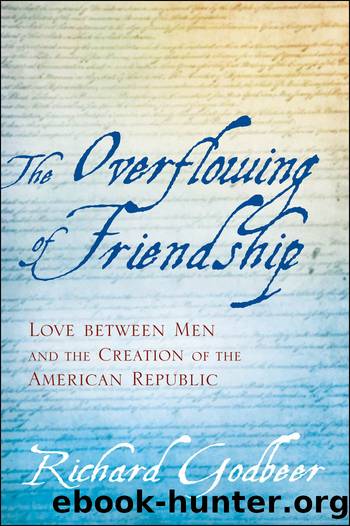The Overflowing of Friendship: Love Between Men and the Creation of the American Republic by Richard Godbeer

Author:Richard Godbeer [Godbeer, Richard]
Language: eng
Format: epub
Tags: history, United States, General, Social Science, Gender Studies, LGBTQ+ Studies, Gay Studies, Americas (North; Central; South; West Indies)
ISBN: 9780801891205
Google: Vs3-DwAAQBAJ
Publisher: JHU Press
Published: 2009-01-12T00:13:04.568522+00:00
Contemporaries were well aware that Continental army officers described themselves as âbrothersâ in a âfamilyâ that was tight-knit, loving, and supportive. New England dramatist Royall Tyler addressed this sense of kinship among patriot officers in The Contrast, a play first performed in April 1787 at the John Street Theater in New York City. Colonel Manly, who has just arrived in New York, declines an invitation to âsee the cityâ with a foppish character named Billy Dimple, even though the latter is âknown to almost every family in town,â on the grounds that he has business to attend to and that his own âfamilyâ will âbe anxious to hear from [him].â Maria, a young lady with secret designs on the officer, concludes from this remark that he must be married and so asks him, âHow did you leave your lady, sir?â But Charlotte, Manlyâs sister, assures Maria that it is âonly an odd way he has of expressing himself.â Colonel Manly himself goes on to explain: âI call my late soldiers my family. Those who were not in the field in the late glorious contest, and those who were, have their respective merits; but, I confess, my old brother-soldiers are dearer to me than the former description. Friendships made in adversity are lasting; our countrymen may forget us, but that is no reason why we should forget one another.â Indeed, Colonel Manly is in New York âto solicit the honorable Congress, that a number of my brave old soldiers may be put upon the pension-list, who were, at first, not judged to be so materially wounded as to need the public assistance.â He is there, in other words, to take care of his âfamily.â52
When officers referred to themselves as fellow members of a military family, they conferred on their relationships with one another a meaning and status that paralleled those of a domestic household. As we have already seen, the family served in early American society not only as the basic unit of social identity but also as a fundamental point of reference for understanding any kind of relationship.53 In the past, familial imagery had been used most commonly and conventionally to evoke the authority exercised by fathers and husbands, but American revolutionaries were much more interested in the ties of brotherhood. In a manifesto issued by George Washington in 1778 on behalf of the Continental army, the general declared that patriots âinvite[d] all nations to mutual friendship and brotherly love.â The commander-in-chiefâs choice of words was deliberate and part of a larger rhetorical strategy that had taken shape during the decade preceding Independence. As early as 1768, faced with a parent country that had confounded their expectations and trust, John Dickinson envisaged âa band of brothersâ joined in ârighteous contest,â âcemented by the dearest tiesâ and âthat sympathetic ardor which animates good men confederated in a good cause.â Six years later, another opponent of British policies also envisaged âpatriots and heroesâ joined as âa band of brothers.â54
As Americans became disenchanted
Download
This site does not store any files on its server. We only index and link to content provided by other sites. Please contact the content providers to delete copyright contents if any and email us, we'll remove relevant links or contents immediately.
| Africa | Americas |
| Arctic & Antarctica | Asia |
| Australia & Oceania | Europe |
| Middle East | Russia |
| United States | World |
| Ancient Civilizations | Military |
| Historical Study & Educational Resources |
Never by Ken Follett(2872)
The Man Who Died Twice by Richard Osman(2289)
Machine Learning at Scale with H2O by Gregory Keys | David Whiting(2264)
Fairy Tale by Stephen King(2058)
Will by Will Smith(2032)
Rationality by Steven Pinker(1760)
The Dawn of Everything: A New History of Humanity by David Graeber & David Wengrow(1564)
The Dark Hours by Michael Connelly(1562)
Principles for Dealing With the Changing World Order: Why Nations Succeed and Fail by Ray Dalio(1368)
Friends, Lovers, and the Big Terrible Thing by Matthew Perry(1321)
A Short History of War by Jeremy Black(1295)
HBR's 10 Must Reads 2022 by Harvard Business Review(1251)
Go Tell the Bees That I Am Gone by Diana Gabaldon(1231)
Can't Hurt Me: Master Your Mind and Defy the Odds - Clean Edition by David Goggins(1218)
515945210 by Unknown(1205)
Fear No Evil by James Patterson(1106)
443319537 by Unknown(1069)
Works by Richard Wright(1017)
Going There by Katie Couric(988)
